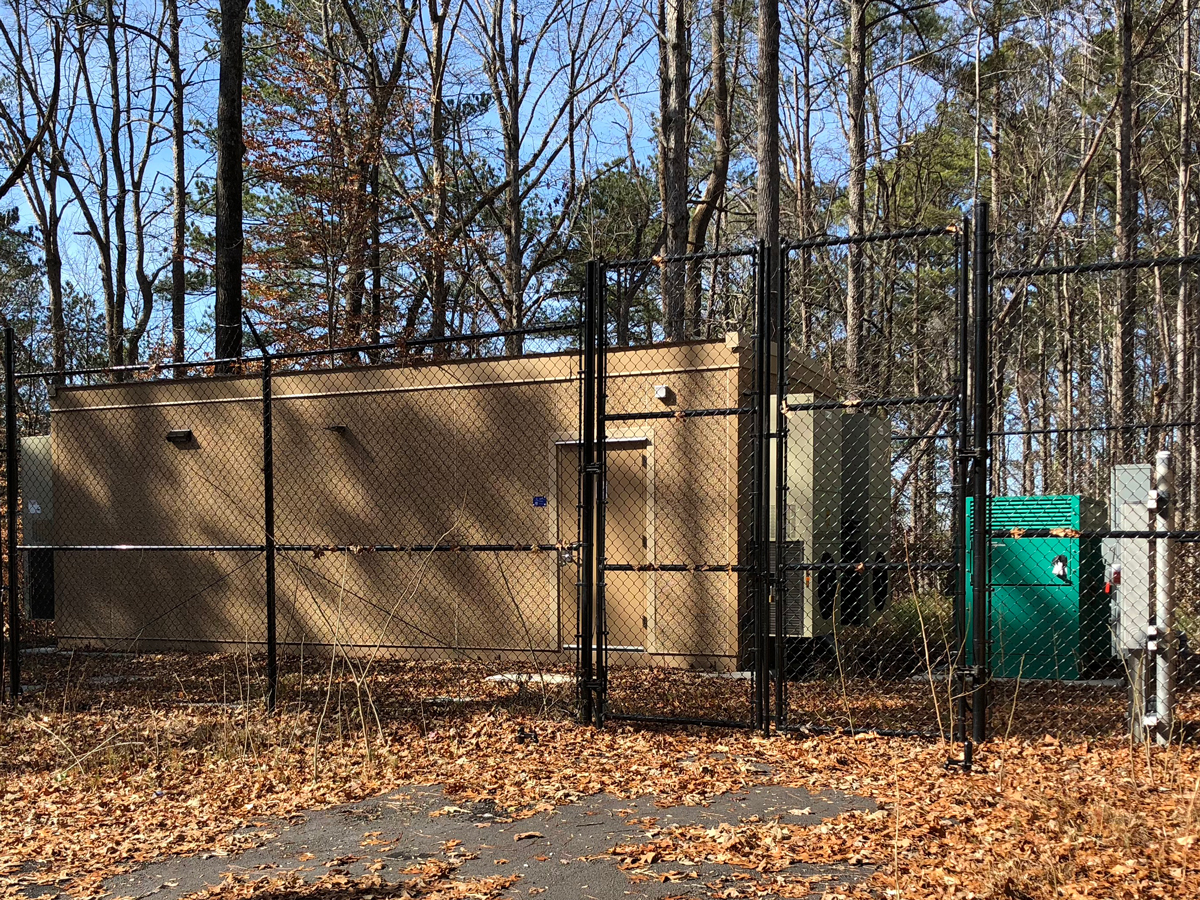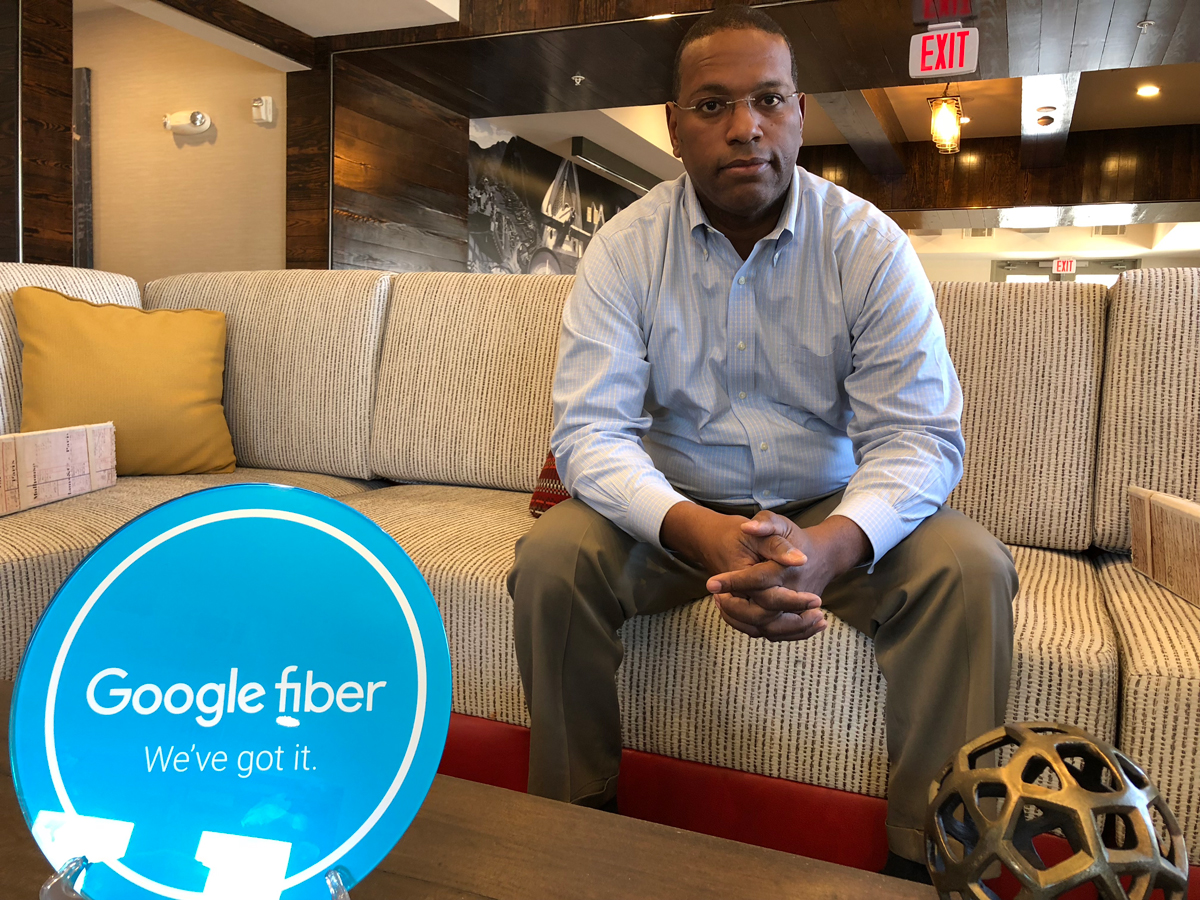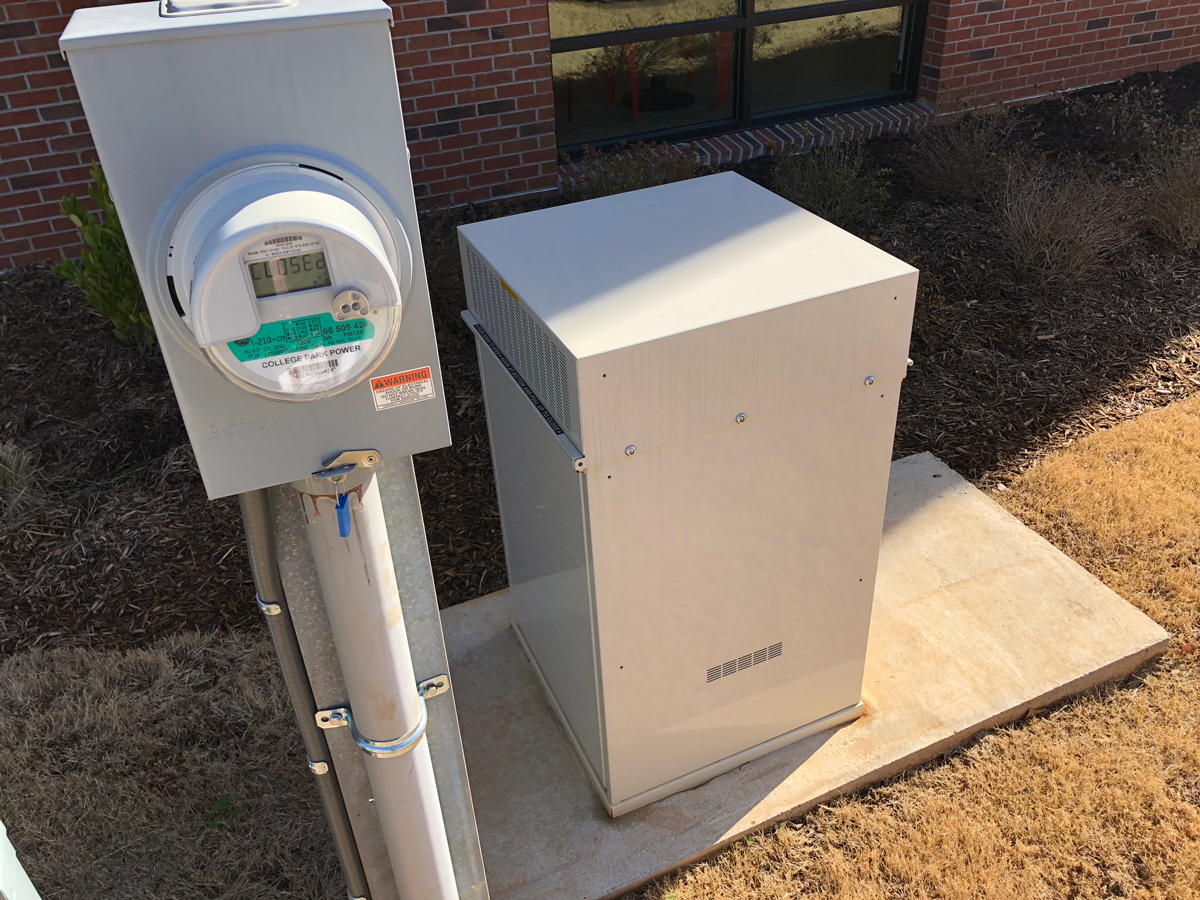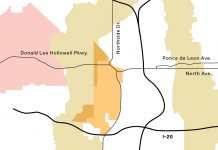
Illustration by Wes L Cockx
It’s been more than three years since Google Fiber frenzy took hold of the Atlanta area. You might still have the T-shirt.
From Alpharetta to Avondale Estates, College Park to Decatur, folks fed up with chronically unreliable internet connections, abysmal customer service, and expensive monthly bills lapped up Google Fiber’s promise to change all that. And there was an altruistic component, too: Google Fiber would help close the digital divide in part by extending discounted or free high-speed internet to low-income residents.
If smiling politicians were a barometer, the January 2015 press conference to trumpet Google Fiber’s selection of Atlanta as its next fiber city was the region’s biggest announcement since the city landed the ’96 Olympics. The mayors of Avondale Estates, Brookhaven, College Park, East Point, Hapeville, and Smyrna—cities that, along with Decatur and Sandy Springs, also would be connected to Google Fiber—glowed as then Atlanta Mayor Kasim Reed spoke on their behalf. “Abundant high-speed broadband access will make our economy stronger and make our community stronger,” Reed gushed.
As Google Fiber’s director of marketing, Scott Levitan, told the crowd: “Google Fiber will help put Atlanta on par with the fastest cities in the world like Seoul, Tokyo, and Zurich.”
Levitan portended hundreds of trucks and crews would descend on area streets as the massive Google Fiber infrastructure project unfolded. “[It] will take a while before everyone’s neighborhood is served,” Levitan advised, adding that the process could last a “couple of years.” But no matter the timeline, Levitan assured, “we’ll do our best to keep you informed along the way.”
Initially, a two-year timeframe looked reasonable. By summer, crews laying fiber-optic cable were busy demolishing sidewalks and closing streets to traffic—and, in the process, infuriating commuters and residents. There also were allegations of costly damage to infrastructure. Georgia’s Public Service Commission stepped in to investigate after a Google Fiber contractor, S&N Communications, ruptured utility lines three dozen times. A decision on whether to fine the company up to $10,000 per violation is expected this month.
Beyond the activity some residents saw at the street level, plenty of action was taking place behind the scenes. Engineers mapped out nearly every mile of fiber—enough to get to Iceland, according to Google. The backbone of the system is a miles-long ring of fiber cables circling the city; from there, glass optical lines branch off and feed into “fiber huts,” structures about the size of a one-car garage. Within Atlanta’s city limits, Google installed a dozen of the prefab units between mid-2015 and early 2016 at a cost of about $150,000 to upwards of $250,000 each.
Once inside the hut, Google’s fiber optic cables snake through rows of switches, amplifiers, and other equipment before embarking on the last mile or so to customers’ homes—20,000 to 30,000 homes per hut. That last mile has proven to be the trickiest and the most expensive mile of the overall buildout. (Google Fiber has not disclosed the total cost of the Atlanta project, but its first fiber foray, in Kansas City, is believed to have carried a billion-dollar price tag.)

Photograph by Jim Burress/WABE
Google has released little public information about the Atlanta rollout delays, and company officials declined multiple requests for a comment on the status of the project and other specifics. But it’s possible that, in the time it has taken Google Fiber to figure out how to travel the last mile to people’s homes, fiber optic technology is no longer the best way to get there.
Atlanta isn’t the only city to see Google Fiber falter. In Nashville, big telecom operators sued and all but blocked Google Fiber from tapping half of the city’s 88,000 utility poles, which it needed to build out its fiber system. Nearly four years after the company announced it was coming to Nashville, Google Fiber finally reached 10 Nashville neighborhoods late last year.
Less than a year later in Atlanta, one thing is indisputable: most Google Fiber hopefuls are now fed up with its stalled promise.
In Atlanta, Google Fiber has derailed.
WIRED AND WAITING
“Up here on the ceiling,” Midtown resident Jeffrey Welch said, pointing at the crown molding of his second-floor condo near Piedmont Park, “there’s a [nearly] invisible cable.”
You’d need to squint to see it, but there it was: real, actual, honest-to-god fiber optic cable, made of one sliver of glass about the diameter of a human hair.
Jeffrey Welch has Google Fiber. Kind of.
The wiring is there, but more than a year after installing it—at a cost of $13,000 to the condo association that manages the 69-unit complex, according to Welch—Google Fiber has yet to throw the switch. Still, Welch and his neighbors are actually much further along than the vast majority of Atlantans.
It’s not because Atlanta has been unwelcoming. Municipalities across the metro area have made concessions to pave the way for Google Fiber. Few have been as accommodating as the city of College Park.
“It does come with a certain cachet,” College Park city manager Terrence Moore said of the gigabit-speed service. “Frankly, it’s a benefit to us because we have the opportunity to market ourselves as a Google Fiber community.”
Moore said College Park officials removed much of the typical bureaucratic red tape in the city’s permit process. That allowed Google Fiber to ramp up its planning and design phase and begin construction, according to city officials. “We’ve done everything humanly and organizationally possible to support Google Fiber in an effort to bring their products to the community,” Moore continued.
By the end of January 2018, Google Fiber had met the city’s requirements for expanding into the northern sections of College Park, according to William Moore, head of engineering for College Park. He said only a few small steps remained before workers could begin deploying fiber and connecting customers; Google Fiber representatives needed only to sign an application and write a $250 check for each of the four required permits.
But Google Fiber’s people never stopped by City Hall to finish the process, he said.
The delay has bothered Michelle Suzette Jones, a College Park bungalow dweller and three-year Google Fiber customer-in-waiting. “We get the short end of the stick here, so maybe it’s ingrained in me to be suspect,” Jones said of living in College Park. “When something says it’s coming down this way and then it suddenly doesn’t, [I have] to wonder, is it because [College Park is] browner? It’s poorer?”

Photograph by Jim Burress/WABE
The newly constructed Pad on Harvard (where rents average $1,200 a month) is the lone beneficiary of College Park’s three-year effort to woo Google Fiber. Not that it was easy. The project’s developer, Rod Mullice, said he lobbied Google Fiber personally and “aggressively.” Mullice, who has a background in transit-oriented development, also said he pointed out to Google Fiber that miles of surplus, unused fiber optic lines—dark but still capable of transmission—were accessible not far from his development, at MARTA’s College Park transit station.
According to Mullice, his efforts paid off. He said Google Fiber strung a relatively short cable between the College Park station and the Pad, then arranged for the dark fiber to be lit.

Photograph by Jim Burress/WABE
Mullice said the Pad’s residents have had nothing but positive experiences with Google Fiber, but he still questions how the company has handled its commitment to the area. “It doesn’t give me great joy,” he said. “I want everybody to have it.”
THE TROUBLE WITH DIGITAL INCLUSION
In Kansas City, Austin, and Provo, Google Fiber did something almost too good to be true. It handed out free internet (for up to seven years) to anyone willing to pay a one-time installation fee of $300. Sure, the gratis package offered was one-200th the speed of Google Fiber’s drool-inducing gigabit plan. But the deal still managed to create a good bit of buzz.
By the time Google Fiber put out its shingle in Atlanta, it had dropped the on-the-house package in favor of a $50 (and much faster) monthly plan. But the company still planned to offer limited low- or no-cost service to certain residents. Terrence Moore, College Park’s city manager, said he understood Google Fiber would make a free or discounted plan available to those who couldn’t afford to pay, although he said Google Fiber provided no specifics.
Under an Obama administration program known as ConnectHome, people who have school-aged children and live in public housing in select cities—Atlanta included—became eligible for free, full-on gigabit speeds through Google Fiber. By summer of 2015, Google Fiber representatives approached the Atlanta Housing Authority with a proposal: allow them to hook up the 282 apartments at AHA’s Cosby Spear Highrise in the Old Fourth Ward, and, for the next decade, neither residents nor the AHA would pay a penny for access.
In exchange, Google Fiber wanted what AHA read as an exclusive, 10-year license to install, operate, and maintain fiber optic equipment at Cosby Spear, according to emails obtained by WABE and Atlanta magazine. (Google Fiber told AHA it wasn’t seeking exclusivity but refused to put that language into the proposed contract.) Later, Google Fiber broadened the request to include AHA’s Martin Street Plaza and Westminster Apartments properties, which would get free service for four years. Google also wanted AHA’s permission to market its products—both free broadband internet and not-so-free television—to residents.
“Google’s response tells me that they are not really taking our concerns seriously.”
The idea of exclusivity raised some eyebrows at the housing authority. AHA officials stood firm that Google Fiber “needs to have nonexclusive rights to allow access to other carriers,” according to a March 2016 internal memo. And then there was the timeline. Google Fiber wanted up to three years from the date of a signed contract to flip the fiber switch and begin providing residents with service. The housing authority only wanted to wait one year. Google refused to budge.
“Google’s response tells me that they are not really taking our concerns seriously,” wrote AHA attorney Lou Cataland in an email to the housing authority’s upper management. “Given the vast differences between our positions, going back and forth with red lines will likely be a waste of time.”
After more than a year of negotiations, the deal soured.
Atlanta Housing Authority spokesperson Cecelia Taylor declined multiple interview requests, citing concern from AHA executives over how it might look to current or future partners—including Google Fiber—if someone from the organization talked.
Google Fiber also declined requests for comment. Instead, Google Fiber spokesperson Sunny Gettinger emailed a statement, which read in part: “We do provide support to families who rely on housing assistance, in the form of underwriting computer labs and hosting free digital literacy classes and STEM/after-school programs at recreation centers, libraries, and other community sites embedded within our most vulnerable neighborhoods. We continue to work with the AHA to identify ways to connect this population and [are] also working with other community partners to advance digital inclusion in Atlanta.”
UNCHECKED POWER
Greg Fender knows most Georgia mayors and city managers on a first-name basis and says he gets calls from at least one of them every week. As a Georgia Municipal Association contractor who helps cities with cable and telecommunications issues and agreements, Fender offers these local officials—free of charge—advice on how to negotiate often hefty fees from private companies seeking to use public rights of way. When it became clear that Atlanta and a handful of surrounding cities were likely going to be the next Google Fiber recipients, Fender expected he’d soon be looking over contracts and advising local officials about what came next. That’s because all of Google Fiber’s distribution huts are in public parks or other public rights of way.
But no one sought him out. Fender wondered if city officials might be so excited about Google Fiber that they didn’t want to rock the boat. He also wondered if Google Fiber might have used its familiar name and brand power to convince officials to stay mum.
If a Google Fiber nondisclosure agreement obtained by WABE and Atlanta magazine is any indication, Fender’s conclusion wasn’t a stretch. To move forward with discussions “concerning existing or future product development efforts,” Google Fiber required one local government agency to sign a confidentiality statement that silenced it for three years.
“We concluded that we would pause the pace of rollout . . . so that we could spend time on, ‘How do we really bring technology to bear in a more meaningful way?’”
Asked about the nondisclosure agreements, Google Fiber spokesperson Gettinger said in an email: “When we first start working with cities and partners, we do often enter into NDAs with them simply because of the amount of confidential and competitively sensitive information we share, especially in the early days of the project.”
Fender points to another high-profile company that’s using what he’s coined “the Google model” of doing business: Amazon. The retail behemoth’s strategy for choosing a location for its coveted second headquarters relies on city leaders offering up the best incentives—including softening regulations and easing protocol.
“I caution cities against doing that,” said Fender, adding that playing by those rules puts almost unchecked power in the hands of the private company, often at the expense of the city.
While no local municipality called on Fender to help with Google Fiber prior to finalizing the deal, at least one used his services after. Upon his company’s review, it turned out Google Fiber wasn’t providing the city of Duluth detailed enough information about how it calculated and paid monthly franchise fees—money paid to a municipality based on how many subscribers a provider services.
Fender’s son Ryan, who works side-by-side with his father from the family’s basement in Dahlonega, said Google Fiber has since addressed some, but not all, of the payment issues.
And when Fender stated his willingness to conduct a routine audit of Google Fiber’s franchise fee payments to Duluth—something he’s done for Duluth in relation to other providers—city officials declined.
GOOGLE FIBER’S LOSS = GOOGLE’S GAIN
Google Fiber has never given a definitive answer as to when it will complete its Atlanta rollout. A review of hundreds of emails, internal memos, and other correspondence shows Google Fiber was careful not to make such promises—even to top officials, and even as it expanded to new cities across the nation.
“We continue to see Fiber as a huge market opportunity,” said Ruth Porat, the CFO of Google Fiber’s parent company, Alphabet Inc., on a call with investors in July 2016.
When asked earlier this year about Fiber’s progress, Porat was more circumspect.
“We concluded that we would pause the pace of rollout . . . so that we could spend time on, ‘How do we really bring technology to bear in a more meaningful way?’” Porat said during a Q&A at the Morgan Stanley Technology Conference in San Francisco in February.
That pace is likely to pick up only when Google Fiber has “something that is substantive enough [in] value to justify accelerating the rollout again,” added Porat.

Photograph by Jim Burress/WABE
Analysts believe that “something” likely involves wireless data transmission. In the past few years, the company has started to look at how it might shed its dependency on fiber optic cables along the costly and cumbersome “last mile,” potentially bypassing the cables with wireless connections. In 2016, Google Fiber acquired WebPass, which found success in delivering wireless high-speed connections to large apartment buildings in major urban areas.
In the time that Google Fiber has left Atlanta consumers waiting, Comcast and AT&T—the two dominant broadband providers serving the area—have improved and expanded their networks. That’s one reason why almost nine out of 10 Fulton County households currently are able to access Internet speeds of 250 mbps or greater. In fact, Comcast and AT&T now advertise speeds equal to or greater than Google Fiber’s gigabit package.
AT&T’s monthly sticker price is $80, while Comcast charges between $115 and $140 (both offer highly discounted promotional deals; AT&T offers even deeper discounts if you’re willing to have your data tracked). Google Fiber’s service—where it exists—is cheaper.
And even though its availability lags behind that of its competitors, Google Fiber is, in a way, still benefiting.
Google itself makes most of its money putting ads in front of consumers’ eyes. More bandwidth and faster connections—even when offered by competitors—mean Google can place ads faster and more efficiently.
While Google Fiber hasn’t disrupted the broadband market in any material way, “they have spurred competition and created fiber where there wasn’t going to be any fiber,” said Seth Wallis-Jones, consumer analyst at IHS MarkIt. “So in that respect, they’ve succeeded.”
STILL IN THE DARK
Local governments barely hear a whisper out of Google Fiber these days, according to Fender. After being in the dark for months, last August Smyrna’s leaders got an update from Google Fiber, which led former Smyrna Mayor Pro Tem Teri Anulewicz to express disappointment that the process wasn’t moving as quickly as first hoped.
“Google Fiber has assured us they’ll continue to work with us toward the goal of expanding broadband connectivity for more people in Smyrna,” Jennifer Bennett, the city’s community relations director, wrote in an email.
While some Smyrna apartment complexes were in the process of being connected, Bennett said Google Fiber wasn’t planning to build out the network or provide general service to all of Smyrna immediately.
That was 10 months ago. Google Fiber hasn’t provided the city any additional update since then, according to Bennett.
As for Jeffrey Welch, the Midtown condo-dweller whose Google Fiber line was installed last summer, he’s still waiting. Google Fiber customer service has repeated to him what agents have told other anxious customers: Hang tight. Fiber service is just another four to six weeks away.
About this story: This article was produced in partnership with WABE 90.1 FM, where Jim Burress is an award-winning investigative reporter. This story is part of an investigative journalism collaboration supported by the Corporation for Public Broadcasting. Listen to WABE for more on Google Fiber.
Correction: Due to an editing error, an earlier version of this story misstated that Comcast offers discounted data plans in exchange for tracking your data. Comcast does not track customers’ data.
This article appears in our June 2018 issue.














